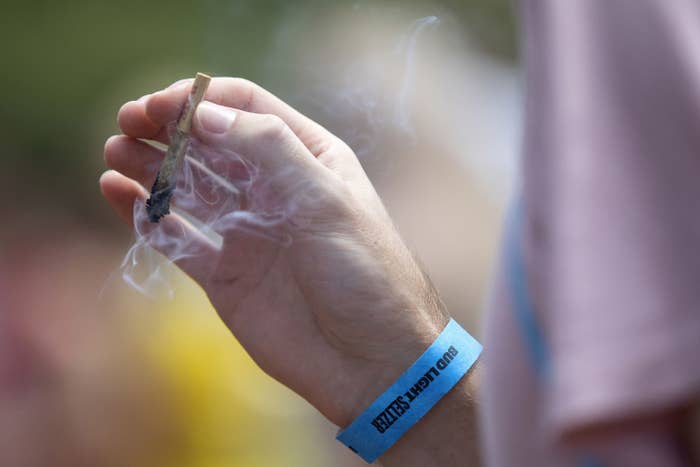
All patients undergoing a surgery that requires anesthesia should be asked if they use cannabis, either recreationally or medicinally, according to new guidelines.
The recommendations for doctors, which are the first of this kind, were released this week by the American Society of Regional Anesthesia and Pain Medicine.
Some of the questions an anesthesiologist might ask you include the type of cannabis products you use, how you consume them (smoking, ingesting, etc.), how often you use them, how much you use, and how recently you had your last dose.
Many anesthesiologists already ask patients about their illegal drug use before surgery, but some cannabis users, particularly those who live in states where recreational use is allowed, may not consider cannabis an illegal drug and therefore won't tell their doctors that they use it.
The new recommendations endorse the use of "direct clear questions" about cannabis use for anesthesiologists who aren't already doing so, ASRA president Dr. Samer Narouze told BuzzFeed News.
The guidelines are based on studies that show some regular cannabis users may experience more pain and nausea after surgery, sometimes requiring additional medications such as opioids compared to people who don’t use cannabis frequently or at all.
Not everyone shares the same experience, though, Narouze said: "Many will use cannabis safely and have a smooth postoperative course, but some may not do as well and require special attention."
Other recommendations include postponing procedures if patients have an “altered mental status,” aka are high, at the time of surgery, counseling regular cannabis users on the “potentially negative effects” the drug has on postoperative pain control, and informing pregnant patients about the risks cannabis use poses to a fetus.
Anesthesiologists may also consider delaying surgeries for at least two hours after smoking cannabis because of an increased risk of heart attack before, during, and after surgery, the guidelines say, although the evidence behind this recommendation isn’t as strong.
Put together by a committee of anesthesiologists, chronic pain physicians, and a patient advocate, the recommendations were designed in response to the surge in cannabis use over the last two decades, especially among young adults, as legalization expands across the US.
A National Institutes of Health study published last year found that cannabis use in adults ages 19 to 30 reached the highest levels ever recorded since 1988, when researchers began to monitor these trends. The proportion of this group that reported past-year cannabis use went from 29% in 2011 to 34% in 2016 to 43% in 2021. More than 1 in 10 young adults reported daily cannabis use in 2021, according to the report, which means they consumed the drug on 20 or more occasions in the last month.
Overall, cannabis is the most commonly used federally illegal drug in the US.
Dr. Bonni Goldstein, the medical director of Canna-Centers, a California-based practice that educates patients about the use of cannabis for serious and chronic medical conditions, told BuzzFeed News that she agrees with the new guidelines, but that they may not apply to people who use the drug for medicinal purposes.
“I would hope that anyone in this situation (i.e., having surgery that requires anesthesia) who is using cannabis would understand that sharing this information and being honest is in their best interest,” Goldstein wrote in an email, adding that most of the research referenced in the new guidelines used data from people who likely weren’t using cannabis under medical supervision.
“Some patients can discontinue [cannabis use] before surgery and others cannot (for instance, someone using cannabis to control seizures),” said Goldstein, who is the author of the book Cannabis Is Medicine. “Patients and the physicians responsible for their care should be the ones making the decision on whether or not to discontinue cannabis before elective surgery, rather than some generic time frame.”
People who use cannabis to alleviate symptoms and improve their quality of life often use a “minimal effective dose,” which is the lowest dose needed to provide the best outcome with the least side effects and avoid developing a tolerance to its medicinal effect, Goldstein said; this means they don’t need to increase dosing over time.
Recreational users, however, can build a tolerance to the effects of THC — the compound responsible for the high people feel — leading them to use more of the drug to feel the desired effects, Goldstein said. “A subset of this group will end up with unwanted issues due to very high THC dosing,” she said.
Not everyone agrees these recommendations are useful, though. Martin Lee, cofounder of Project CBD, a nonprofit based in California that publicizes research on the medical uses of CBD and other components of the cannabis plant, called the guidelines “over-the-top.”
“The best way to proceed would be to inform patients that they should not consume cannabis or CBD after midnight on the day before surgery,” Lee told BuzzFeed News in an email. “That would eliminate the possibility of an unwanted interaction between cannabinoids and anaesthesia.”
The experts behind the new guidelines said the recommendations “are not intended to replace clinical judgment, but rather promote improved patient communication and possibly improved outcomes.”
They also mention that “low-dose, medically supervised use likely has a lower risk of negative effects,” so people who use the drug for medical reasons should continue to do so throughout the surgery process. “On the other hand, the consensus panel believes recreational use should be discouraged similar to cigarette smoking.”
Due to a lack of evidence, the guidelines do not suggest a need to test people for cannabis use. Goldstein said she agrees with this point as well, “especially if the anesthesiologist approaches the patient with an empathetic bedside manner and not with negative judgment about cannabis use.”
“Elderly patients,” Goldstein specified, “are still somewhat nervous to share that they use cannabis as, per published surveys, they fear being labeled ‘potheads’ or ‘stoners.’”
Why might regular cannabis users feel more pain after surgery?
Generally, it’s thought that people who regularly use cannabis, particularly those who use it to manage symptoms from an illness, experience more pain after surgery because their bodies have become dependent on the drug for pain management.
So not having access to cannabis immediately after a surgical procedure may make it harder to push through the pain, according to Dr. Elyad Ekrami, a clinical research fellow with the Outcomes Research Department at Cleveland Clinic’s Anesthesiology Institute.
Ekrami is the lead author of a study that found that people who used cannabis within 30 days before surgery experienced 14% more pain the following day than patients who didn’t use cannabis. They also needed 7% more opioids during recovery, which wasn’t statistically significant, but “likely clinically relevant.”
The findings were based on the health records of more than 34,500 adults, over 1,600 of whom were cannabis users, who had elective surgeries at Cleveland Clinic between 2010 and 2020. (The study was presented at the American Society of Anesthesiologists’ annual meeting last year and has not been published in a peer-reviewed journal.)
Another theory, which Ekrami said requires more study, is that long-term cannabis use can suppress the cannabinoid receptors in the brain that deal with pain management, similar to long-term opioid use. However, research has contradicted that comparison, suggesting that regular cannabis use does not increase pain sensitivity in this way.
This idea could also explain why chronic users may need more anesthesia before surgery.
A 2019 study published in the Journal of Osteopathic Medicine found that regular cannabis users may need more than two times the normal amount of sedation before medical procedures. Those who smoked or ingested the drug on a daily or weekly basis needed 14% more fentanyl, 20% midazolam, and 220% more propofol to safely undergo routine procedures such as colonoscopies.
The experts who developed the new guidelines also said that recreational cannabis can be mixed or laced with pesticides, heavy metals, and carcinogens, all of which “could have significant effects on perioperative outcomes.”
UPDATE
This article has been updated to reflect the fact that many anesthesiologists already ask questions about cannabis use before surgery, but the new guidelines recommend clear questions about cannabis use for doctors who don't already do so.
